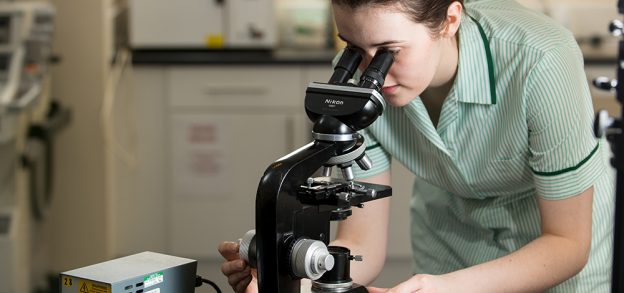For those looking to train as a veterinary nurse, the good news is that there is more than one way to make your dreams a reality! Aspiring veterinary nurses can achieve professional registration with the Royal College of Veterinary Surgeons (RCVS) through either a university degree or via a level 3 diploma.
The way in which your training is structured and delivered will differ depending on which path you choose to undertake, however both programmes of study offer unique benefits and are recognised as evidence of a high quality education.
Varied learning opportunities is great news for vet nurses to-be everywhere, as it means you can choose the programme of study that is best suited to your circumstances. All this being said; having more than one programme on offer naturally begs the question: which one is right for you?
Let’s take a look at both routes and find out…
Level 3 Diploma in Veterinary Nursing / Advanced Apprenticeship
The Level 3 Diploma in Veterinary Nursing can be studied by those who are already employed in a veterinary practice, as well as those who have not been able to secure a paid training position in practice.
College sessions offer diverse teaching, learning and assessment approaches catered for the individual needs of learners, enabling you to develop the required knowledge and skills needed to work as a qualified, Registered Veterinary Nurse (RVN).
Provided you find suitable employment in a veterinary Training Practice (TP or aTP), the programme can also be undertaken as part of an apprenticeship. The main benefit of studying the diploma as an apprentice is that your training will be paid for by the employer, meaning it would be a debt-free route into the profession. View the latest apprenticeship opportunities at CAW
For those who do not hold the qualifications needed to enrol onto a degree programme, the diploma could be an excellent alternative. In order to apply for the diploma you must have a minimum of 5 GCSEs at grades A*-C (or 9-4) including English Language, Mathematics and a Science subject.
Another route into veterinary nursing: Study Veterinary Care and Functional Skills
If you do not meet the GCSE entry requirements, other qualifications may be acceptable. For example, at The College of Animal Welfare successful completion of our Level 2 Certificate for Veterinary Care Assistants or Level 2 Certificate in Veterinary Care Support qualification, in combination with a full level 2 qualification in Maths and English (e.g. GCSE Grade A*-C or Level 2 functional skills qualifications), will allow you to apply for the Level 3 Diploma in Veterinary Nursing or Advanced Apprenticeship in Veterinary Nursing programmes, subject to employment in a veterinary practice that is approved to train veterinary nurses (a TP or aTP).
Entry onto the diploma programme can be very competitive, take a look at how you can strengthen your application.
Diploma students can qualify as a veterinary nurse in as little as 2 1/2 years, meaning the programme could be the route for if you are perhaps not in the position where you can take the three to four years of study necessary to gain a degree.
If you think this could be the option for you, your next step would be to find a suitable training provider. There are various colleges around the UK that offer this programme, a list can be found on the RCVS website. The College of Animal Welfare offers the Level 3 Diploma in Veterinary Nursing programme from centres all over the UK, with intakes starting throughout the year.
Apply to start the Level 3 Diploma in Veterinary Nursing
BSc (Hons) Veterinary Nursing / FdSc Veterinary Nursing
For those who would prefer to study at degree level, or are eager to experience the university life for all that it entails; such as moving away from home, mixing with new people and gaining new experiences – undertaking a veterinary nursing degree programme could be for you.
Degree programmes are generally either three or four years in length. During this time you will have the opportunity to undertake work placements in a variety of veterinary practices.
Going to university offers the opportunity to be taught by world renowned clinicians who are experts in their field. If you’re interested in post-graduate opportunities such as training in specialist areas like physiotherapy, or training for a career in teaching, university study is for you.
There are various universities around the UK that offer this programme, a list can be found on the RCVS website. The College of Animal Welfare offers the FdSc Veterinary Nursing and BSc Honour Veterinary Nursing degree programmes in conjunction with universities across the UK. For more information about these courses, including entry requirements and application details, click on the links below…
- BSc Honours Veterinary Nursing with Foundation Year (Middlesex University)
- BSc Honours Veterinary Nursing Degree – Middlesex University (London, Huntingdon or Leeds)
- FdSc Veterinary Nursing – Royal Veterinary College, London
If you would like to have an informal chat with one of our course advisors about which training option would best suit your circumstances, a member of our Customer Advice Team (CAT) can be contacted at admin@caw.ac.uk or on 01480 422060.

